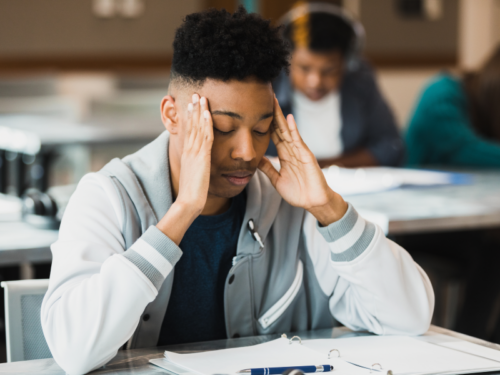
Table of Contents
Mental Health Activities for High School Students

Written By: Ashley Laderer

Clinically Reviewed By: Dr. Don Gasparini
June 26, 2023
7 min.
Many teens today struggle with their mental health. Luckily, self-care activities can help improve overall well-being. Read on for 10 ideas.
Learn more about our Clinical Review Process
Table of Contents
Generation Z is in the midst of a mental health crisis. Gen Z is experiencing increasing rates of mental health challenges and reporting poorer mental health compared to previous generations such as Millenials and Gen X. On the bright side, though, Gen Z actively promotes mental health awareness and having open and honest conversations about mental health.
If you’re a high school student struggling with your mental health, you’re not alone, and there are things you can do. No matter what you’re going through—be it anxiety, depression, loneliness, trauma, or anything in between—you can try some self-care activities to make yourself feel at least a little bit better.
Here are ten mental health activities for high school students.
1. Connect with others
A close support system is crucial for mental health. Whether you’re strengthening your relationships with family members, friends, or fellow students at school, these relationships will not only help you ward off isolation but also help improve your overall well-being. Your support system provides a safe space for you to express your feelings, seek advice, and of course, have fun. Research has found that social support contributes to preventing and treating mental health conditions, so remember to stay connected with others both in and out of school.
2. Get moving
Physical self-care will result in mental health benefits because exercising isn’t just good for your body –– it’s good for your mind, too. Whether you’re working out alone, with a friend, or with a whole team, you will reap the benefits. Exercise releases endorphins, which are feel-good hormones that can boost your mood and reduce your stress levels. Regular exercise can even reduce symptoms of mental health conditions such as depression and anxiety and boost your self-esteem. Make it fun for yourself by doing a kind of movement that makes you happy. Experiment and see what type of physical activity you enjoy the most –– dance, yoga, running, all of the above, or something else entirely.

Intensive therapy with flexible scheduling.
92% of parents would recommend Charlie Health to a friend or loved one.
3. Join a club or team
Joining an after-school club or sports team is a chance to have fun with other students while boosting mental health at the same time. Research has found that extracurricular activities are linked to positive mental health outcomes. Extracurricular activities provide opportunities for personal growth, skill development, social interactions, and a sense of belonging. You might meet fellow students you haven’t met before or create deeper connections with students you already know. It’s nice to be a part of something bigger than yourself that aligns with your interests. If there isn’t already a club at your school related to an activity you love, see if you can start one.
4. Break the mental health stigma in high school
Going a step further than joining a club, you can join (or start) a mental health awareness-related club. This is a great way to open up the dialogue surrounding student mental health at your school, helping make it a safe space for anyone who’s struggling. If your school doesn’t already have a club like this, you can look into starting your own chapter connected to a mental health awareness organization.
A few examples of mental health awareness organizations that work with high school students are:
- Bring Change to Mind: The BC2M High School Program
- National Alliance on Mental Illness (NAMI): NAMI On Campus High School (contact your state or city NAMI branch to get involved)
- Active Minds: Active Minds Chapter Network
Breaking the stigma surrounding mental health conditions can make a huge difference for students suffering in silence.
5. Do volunteer work
Volunteering outside of school for a cause you’re passionate about will not just be a big help to others, but will also benefit your mental health. Helping others can give you a sense of purpose and fulfillment and decrease symptoms of depression and anxiety. Plus, you’ll find social connections and friendships with the other young people who are volunteering.
Choose something you really care about and want to make a difference in –– whether that’s volunteering with a local animal shelter, food bank, hospital, nursing home, environmental support group, or mental health awareness nonprofit. You can ask your high school if they have recommendations for where students can volunteer, or you can reach out to local organizations you’re interested in.
6. Write in a journal
Expressing your thoughts and emotions through journaling can be a powerful tool for self-reflection and emotional release. Putting pen to paper lets you slow down your thoughts, process your feelings, and gain a deeper understanding of yourself. Journaling provides a safe and private space for you to say whatever you want. You don’t have to make everything sound perfect or well-written. This is for your eyes only.
7. Find a creative outlet
Engaging in creative activities, such as playing a musical instrument, drawing, painting, or any other form of artistic expression, can feel super therapeutic. Getting creative and making some art can help you express yourself if you’re feeling angry, sad, or happy. These activities allow you to express your emotions in a fun, healthy way. And, at the end, you will feel a sense of accomplishment with what you created.

8. Practice mindfulness
Mindfulness can help calm your mind, reduce stress, and enhance self-awareness. This is the practice of being fully aware of what you’re feeling and experiencing in the present moment, without trying to interpret it or judge it. Researchers have found that mindfulness-based interventions can be very helpful for teens who struggle with anxiety and depression.
Even small mindfulness practices can make a difference. Try to set aside a few minutes every day to engage in mindfulness exercises, such as deep breathing, body scans, or guided meditations. There are plenty of apps you can use, such as Headspace or Calm, that can help you as you start out. Alternatively, you can even search on YouTube for guided mindfulness meditations. Regardless of how you practice, mindfulness can bring you into the present moment, allowing you to experience some much-needed stress relief.
9. Unplug from social media
Many mental health awareness advocates are aware of the potentially negative impacts of social media on mental health. While social media certainly has its benefits, it can also contribute to feelings of low self-esteem, comparison, and increased FOMO. Take regular breaks from social media and prioritize in-real-life interactions with other students, friends, and family members. Researchers have found that taking just a one-week break from social media can significantly impact mental health and well-being.
10. Seek therapy
While self-care and mental health activities for high school students can be helpful, sometimes they aren’t enough on their own to help improve mental health in more serious instances. Knowing when to ask for help and seek professional care is important. If you’re experiencing mental health symptoms that interfere with your day-to-day functioning and quality of life, this could indicate that you may be dealing with a mental health condition.
Some red flags to look out for include:
- Having trouble focusing in class
- Having trouble maintaining good grades and attendance
- Drinking alcohol or using drugs
- Major changes in appetite
- Changes to sleep (having trouble sleeping or sleeping too much)
- Losing interest in things you used to enjoy
- Avoiding social situations and isolating yourself
- Self-harming behaviors
- Thinking about death and suicide
If you’re not sure what to do, reach out to a trusted adult in your life –– like a teacher, coach, school social worker, principal, or parent. They can help point you in the right direction to professional help and support you in the meantime.
How Charlie Health can help
If you or someone you know is a teen or young adult struggling with their mental health, Charlie Health may be able to help.
Charlie Health aims to end the youth mental health crisis by providing more equitable access to professional care. Our virtual intensive outpatient program (IOP) provides personalized services for teens, young adults, and families dealing with a wide range of mental health concerns, such as:
- Anxiety disorders
- Behavioral issues
- Depression
- Dissociative disorders
- Gender identity and dysphoria
- Mood disorders
- Personality disorders
- Self-harm
- Substance use disorders
- Technology and online addiction
- Trauma
In our program, every individual is matched with a therapist who meets their specific needs. Charlie Health participants are also connected with a group of peers facing similar mental health struggles to help them remember they’re not alone.
Whether you’re exploring mental health treatment options for the first time or searching for extra support, Charlie Health provides individualized and evidence-based mental health care in a safe, supportive space.
Contact Charlie Health to learn more today.
References
https://jamanetwork.com/journals/jamanetworkopen/fullarticle/2773539
https://www.ncbi.nlm.nih.gov/pmc/articles/PMC8808202/
https://www.ncbi.nlm.nih.gov/pmc/articles/PMC9464933/
https://newsroom.clevelandclinic.org/2022/11/28/why-volunteering-can-benefit-your-mental-health/
https://www.ncbi.nlm.nih.gov/pmc/articles/PMC8701759/
https://pubmed.ncbi.nlm.nih.gov/35512731/
https://www.mayoclinic.org/diseases-conditions/depression/symptoms-causes/syc-20356007
https://www.pennmedicine.org/updates/blogs/health-and-wellness/2017/may/teens-mental-health




